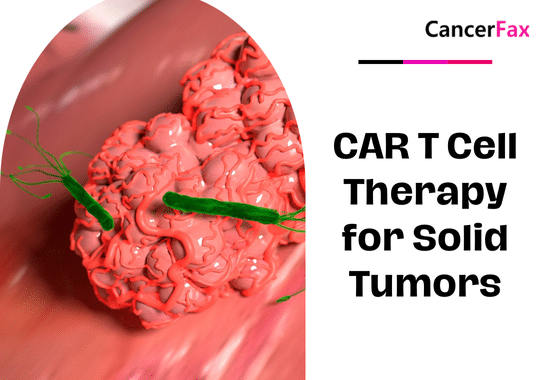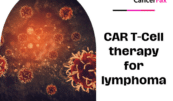CAR T Cell Therapy for Solid Tumors
Introduction
While CAR T cell therapy has demonstrated significant efficacy in treating hematologic malignancies, its effectiveness in treating solid tumors differs significantly. Numerous peculiar difficulties make it difficult to determine whether CAR T cell therapy is feasible in the case of solid tumors like malignancies of the lung, colon, breast, and pancreas. This paper reviews the challenges and current strategies in the development of CAR T-cell therapies directed against solid tumors, considering attained progress, hurdles, and possible future directions.
Challenges of Treating Solid Tumors with CAR T-Cell Therapy
Tumor Microenvironment
Immunosuppressive Environment
Solid tumors typically create a local microenvironment that powerfully suppresses and restrains the function of immune cells, such as CAR T cells. This scenario can involve Tregs, MDSCs, and numerous cytokines.
Permeability Barrier
The compressed stroma in network-solid tumors poses a physical obstacle to the access of CAR T cells into the bulk tumor.
Antigen Heterogeneity
Heterogeneous expression of antigens is generally observed in solid tumors; this means that all the tumor cells will not express the target antigen, leading to incomplete killing of the tumor with subsequent relapse. To make sure that the antigens that are used only target tumor cells and not normal cells, it is important that the epitopes or antigens that are chosen are highly expressed in tumor cells and not expressed at all in normal cells.
On-target and off-tumor toxicity
Safety Concerns
Most of the antigens targeted by CAR T cells in solid tumors are also expressed, to some extent, in normal tissues. Such reactions may lead to severe side effects and damage normal tissues and organs.
Current Strategies and Progress
Target Antigen Selection
Novel Targets
New targets that are specific for solid tumors are continuously being discovered. For example, HER2, EGFR, mesothelin, and GD2 are some of the targets being studied for different solid tumors.
Dual-Targeting CARs
CAR T cells can be made to target two separate antigens, which lowers the risk of antigen escape and off-tumor toxicities.
Improving Infiltration and Persistence of CAR T Cells
Armored CAR T Cells
Changing the genes of CAR T cells so that they release cytokines, like IL-12, or costimulatory molecules can make them even more active and help them stay at the tumor site longer.
Combination Therapies
The combination of CAR T cell therapy with other treatments, be it chemotherapy, radiation, or checkpoint inhibitors, can act as an effective means of modulation within the tumor microenvironment, allowing better infiltration of CAR T cells and subsequent killing.
Overcoming Immunosuppression
Checkpoint inhibitor treatment
Blocking immune checkpoints like PD-1/PD-L1 may help the weak CAR T-cells get stronger again.
Oncolytic viruses
These selectively infect tumor cells to kill them and, on the other hand, modulate the tumor environment to promote CAR T cell activity.
Local Delivery of CAR T Cells
Intratumoral Administration
The direct injection of CAR T cells may help overcome the physical barriers of the tumor stroma and localize the immune response.
Regional Delivery Strategies such as hepatic artery infusion for liver metastases or intrapleural infusion in the setting of mesothelioma are under investigation in an attempt to improve the dynamic delivery of CAR T cells to the site of disease. Clinical Trials and Case Series.
CAR T for Glioblastoma
EGFRvIII-targeted CAR T Cells
Clinical trials of CAR T cells targeting EGFRvIII, a mutation that is present in the majority of individuals with glioblastoma, demonstrate some early efficacy. However, they have shown a necessity for further strategies which enhance persistence and surmount immune suppression within the brain.
HER2-targeted CAR T Cells
Another target under investigation in glioblastoma is HER2. Safety has been demonstrated in initial trials, but only some efficacy has been seen in early studies.
CAR T for Pancreatic Cancer
Mesothelin-Targeted CAR T Cells
Several pancreatic cancers overexpress mesothelin. Early clinical trials and preclinical studies also indicated appropriately favorable outcomes for this subset of CAR T cells, though problems in the tumor microenvironment persist.
CAR T in Breast Cancer
HER2-targeted CAR T Cells
HER2-positive breast cancer is also being studied as a target for CAR T cells in clinical trials. Multiple lines of approach are being pursued to enhance infiltration, persistence, and, thus, efficacy.
Future Directions
Next-Generation CAR T Cells
SynNotch CARs
This stands for synthetic Notch receptors that define CAR T cells that respond to one antigen by expressing a second CAR against another different antigen. This two-step maneuver dramatically improves specificity and reduces off-tumor toxicity.
Switchable CARs
CAR T cells on trial that come with switchable receptors can easily be turned on and off with help from small molecules and can greatly enhance safety and control over therapy.
Universal CAR T Cells
Allogeneic CAR T Cells
Allogeneic CAR T cells are derived from healthy donors. Off-the-shelf preparations are under development or in use to make these cells more accessible for treatment and reduce the expense of this advanced therapy. Genetic modifications are made to the cells to ensure safety and avoid rejection.
Combination with Other Immunotherapies
When you mix CAR T with checkpoint inhibitors like nivolumab or pembrolizumab (anti-PD-1), the immune system is not weakened, and the antitumor response is stronger.
Cancer Vaccines
Vaccines could be used alongside CAR T cells to prime the immune system to the tumor’s antigens for better efficacy.
Applications to Be Explored
Other Solid Tumors
The development of CAR T cell therapy for other solid tumors is underway to identify suitable targets and develop strategies to overcome unique challenges.
Non-Cancer Applications
Besides cancer, CAR T cells are being studied for the treatment of infectious diseases and autoimmune disorders, making them quite versatile and holding potential for many more applications.
LIST OF CAR T CELL THERAPIES AVAILABLE IN THE MARKET WITH THEIR PRICE IN RESPECTIVE COUNTRIES (USD)
|
||||||
| S.No. | CAR T-Cell therapy | Brand Name | Company | Disease | Country | Cost |
| 1 | Tisagenlecleucel | Kymriah | Novartis | BALL / Lymphoma | USA | 500-800,000 |
| Singapore | 400-500,000 | |||||
| South-Korea | 400-500,000 | |||||
| China | 400-500,000 | |||||
| Australia | 400-500,000 | |||||
| Israel | 400-500,000 | |||||
| 2 | Idecabtagene vicleucel | ABECMA® | BMS | Multiple-Myeloma | USA | 500-800,000 |
| Singapore | 400-500,000 | |||||
| South-Korea | 400-500,000 | |||||
| China | 400-500,000 | |||||
| Australia | 400-500,000 | |||||
| Israel | 400-500,000 | |||||
| 3 | Lisocabtagene maraleucel | BREYANZI® | BMS | DLBCL | USA | 500-800,000 |
| Singapore | 400-500,000 | |||||
| South-Korea | 400-500,000 | |||||
| China | 300-400,000 | |||||
| Australia | 400-500,000 | |||||
| Israel | 400-500,000 | |||||
| 4 | Ciltacabtagene autoleucel | CARVYKTITM | Janssen Biotech (J&J) | Multiple-Myeloma | USA | 500-800,000 |
| Singapore | 400-500,000 | |||||
| South-Korea | 400-500,000 | |||||
| China | 250-300,000 | |||||
| Australia | 400-500,000 | |||||
| Israel | 400-500,000 | |||||
| 5 | Axicabtagene ciloleucel | YESCARTATM | Kite Pharma | DLBCL | USA | 500-800,000 |
| Singapore | 400-500,000 | |||||
| South-Korea | 400-500,000 | |||||
| China | 250-300,000 | |||||
| Australia | 400-500,000 | |||||
| Israel | 400-500,000 | |||||
| 6 | Equecabtagene Autoleucel | FUCASO | IASO Biotechnology | Multiple-Myeloma | China | 250-300,000 USD |
| USA | 500-800,000 | |||||
| 7 | Zevorcabtagene autoleucel | Zevor-Cel | Carsgen | Multiple-Myeloma | China | 250-300,000 USD |
| USA | 500-800,000 | |||||
| 8 | CAR T Cell therapy | Trials | Multiple companies | BALL | China | 75-90,000 |
| DLBCL | China | 75-90,000 | ||||
| Multiple Myeloma | China | 75-90,000 | ||||
| Auto-immune disorders | China | 75-90,000 | ||||
| TALL | China | 75-90,000 | ||||
| 9 | CAR T Cell therapy | NexCAR19 | Immunoact | BALL / DLBCL | India | 60,000 |
Conclusion
CAR T cell therapy has shown significant promise in treating solid tumors, offering new hope to patients who suffer from otherwise incurable malignancies. Though there are challenges in store, ongoing research, coupled with innovative strategies, continues to enhance the efficacy and safety of this therapy.
CAR T cell therapy in solid tumors has a promising future, with significant potential for improved outcomes and durable remissions that can benefit a wider range of patients. Moving forward, this treatment will be a prime example of the strength of immunotherapy implemented in this fight against cancer and will, beyond that, offer new hope for patients with otherwise incurable malignancies.
Susan Hau is a distinguished researcher in the field of cancer cell therapy, with a particular focus on T cell-based approaches and cancer vaccines. Her work spans several innovative treatment modalities, including CAR T-cell therapy, TIL (Tumor-Infiltrating Lymphocyte) therapy, and NK (Natural Killer) cell therapy.
Hau's expertise lies in cancer cell biology, where she has made significant contributions to understanding the complex interactions between immune cells and tumors.
Her research aims to enhance the efficacy of immunotherapies by manipulating the tumor microenvironment and exploring novel ways to activate and direct immune responses against cancer cells.
Throughout her career, Hau has collaborated with leading professors and researchers in the field of cancer treatment, both in the United States and China.
These international experiences have broadened her perspective and contributed to her innovative approach to cancer therapy development.
Hau's work is particularly focused on addressing the challenges of treating advanced and metastatic cancers. She has been involved in clinical trials evaluating the safety and efficacy of various immunotherapy approaches, including the promising Gamma Delta T cell therapy.
- Comments Closed
- August 3rd, 2024






CAR-T clinical trials 2023, CAR-T engineering advances, CAR-T for non-blood cancers, CAR-T therapy solid tumors, Solid cancer breakthrough, Solid tumor cellular therapy, Solid tumor immunotherapy, Tumor microenvironment treatment
With a proven success rate exceeding 90%, we offer cutting-edge, state-of-the-art, cost-effective CAR T-cell therapy for all types of cancer.
Please share your medical records via WhatsApp or email us at info@cancerfax.com to receive a detailed treatment plan and cost estimate.
Chat with Susan to learn more >